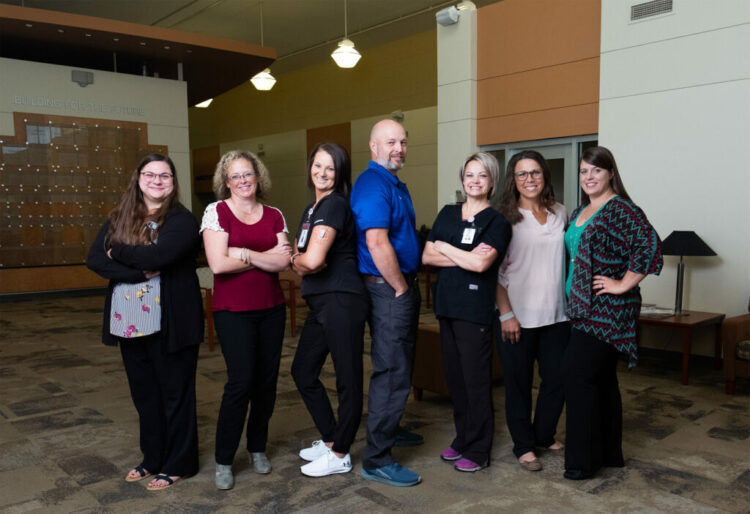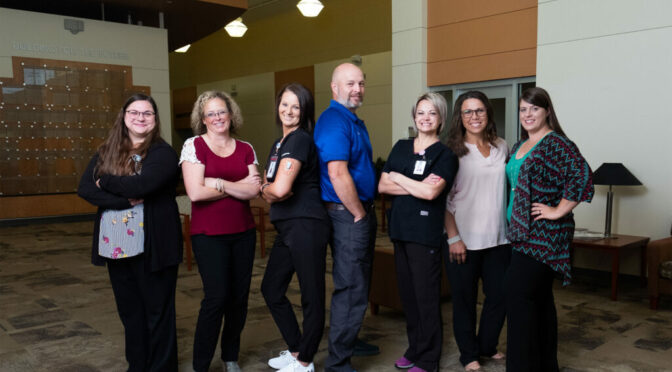
CHC/SEK Diabetes Health Team gets perspective on diabetes by wearing a CGM
The diabetes health team at Community Health Center of Southeast Kansas had a unique opportunity to walk in people living with diabetes shoes by wearing a convenient and lifesaving continuous glucose monitor (CGM).
With a CGM, patients do not have to poke their fingers for readings and they have a constant reading at their fingertips every 5 minutes. The device is compatible with most smartphones and the CGM alerts the patient when their blood sugar is too low or too high. Additionally, there’s an option for their family to be notified.
“If your sugar starts to bottom out then it will be sent to your family member and they can call, or come over to check on the patient,” Diabetic Health Coach Tyffanie Hembree said. “It is very helpful and it seems to be a very successful piece of technology.”
Wearing the device gave the team insight into how to use it and gave them a humbling experience and understanding when visiting with someone living with diabetes.
“It was an eye-opening experience seeing how certain foods affect your blood sugar, and seeing it in real-time makes a difference,” said Diabetic Nurse Educator Travis Searles, RN WCC. “CGM’s take a lot of the guesswork out of treating diabetes. It tells the whole story instead of the average story.”
Diabetes Program Manager Taylor Panczer, MPH, CHES, agreed.
“I decided to wear one because I felt like I could be a better advocate for the patients if I understood their life experiences when it came to Diabetes Care,” she said. “It hit me for the first time that people living with diabetes are truly going through life-changing behaviors. They not only need to learn how their disease affects their body, but then need to learn certain clinical skills that can save their lives, but also kill them if done incorrectly.”
One team member, Kristyn Milburn, NP-C, BC-ADM, lives with diabetes and praised the team for taking the opportunity to learn more.
“I love when those living without diabetes are open to the opportunity of using continuous glucose monitoring (CGM),” Milburn said. “I feel that multiple things happen with this experience. Staff learn through immersion and know the devices inside and out to be able to assist patients in the most effective way possible. Also, one is able to experience just how valuable this tool is – they then become awesome advocates for their patients to have the best tools for the best outcomes.”
Across southeast Kansas, CHC/SEK diabetes health coaches and nurse educators are available to help patients with self-management of their diabetes. The team includes Nurse Practitioner Kristyn Milburn, NP-C, BC-ADM; Diabetic Nurse Educator Travis Searles, RN WCC; Teresa Hall, RN, BSN; Diabetic Health Coaches Amber Findley, Leslie Langford, RT(R), Sara Conkling and Tyffanie Hembree; Dietician Sherise Beckham, Diabetes Program Manager Taylor Panczer, MPH, CHES, and Vice President of Support Services Christi Keating.
They work closely with the Diabetic Nurse Educator, Diabetes Clinical provider, Chronic Care Management, and the Wellness team. Additionally, diabetic health coaches coordinate other healthcare services for dental, vision, podiatry and behavioral health.
As a Diabetes Educator, Searles teaches DSMES (Diabetes Self-Management Education and Support) classes. In the classes, patients learn more about their disease and how to better control it.
CHC/SEK currently has approximately 5,100 patients diagnosed with diabetes with a total of 524 patients enrolled in the diabetes program. CHC/SEK wants to become a Diabetes Center of Excellence to offer the best, quality care the clinic has to offer.
“Overall, wearing a pump and CGM devices was a very eye-opening experience,” Panczer said. “It was almost nothing like I thought it was going to be. Prior to wearing it, I took my pancreas for granted. Not so much anymore. I was definitely living a privileged life that I didn’t even realize.”
